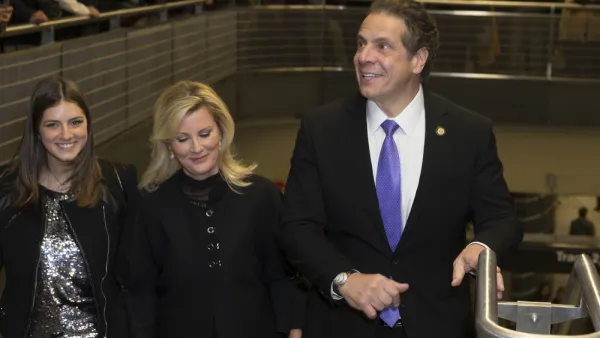Why do green transportation policies attract less intense support than environmentalist policies related to waste and litter?

My city's mayor, Bill DeBlasio, generally fancies himself a strong environmentalist. Yet on transportation issues he has a blind spot; he doesn't seem to have done much for the city's public transit, and he is infamous for having an SUV drive him to a gym instead of walking to a gym near his office.
Mayor DeBlasio is hardly unique: while some parts of the environmentalist agenda have captured the popular imagination and become nonpartisan causes, public transit and similar causes are still boutique issues—certainly popular [pdf] causes, but issues that stir far less public passion than (for example) anti-litter laws or mandatory recycling.
From a purely utilitarian perspective, it is not clear whether this makes any sense. Living car-free impacts one's carbon footprint far more than recycling, upgrading light bulbs, or turning out an extra light now and then. But it seems to me that the latter ideas seem to attract more public interest—perhaps merely because these steps are simply cheaper and more convenient for affluent would-be activists than taking a bus to work or lobbying to reform high-speed streets.
But I'd like to suggest an alternative view. Political views around the world are shaped by several moral foundations: care for others, fairness, loyalty, respect for authority, liberty, and sanctity. The scholarship I have read generally associates the first two values with liberals, and the others with conservatives. All environmentalist activism (including transit-related activism) is based partially on the "care" value. But this basis for environmentalism may have limited political effectiveness, because environmentalism competes with so many other care-oriented charities and social movements.
By contrast, the "sanctity" value supports some forms of environmentalism but not others. The "sanctity factor," according to one commentary on the moral foundations, is "shaped by the psychology of disgust and contamination. It underlies religious notions of striving to live in an elevated, less carnal, more noble way." It seems to me that any issue related to waste implicates humans’ instinct of disgust and fear of contamination. This, the "sanctity factor" may support a desire to reduce waste, and thus increase public support for anti-waste policies such as mandatory recycling or anti-plastic policies.
On the other hand, it is not easy for people to see their commuting habits as wasteful in the same way. Because commuting is not obviously related to trash, even non-drivers are, I suspect, unlikely to view automobiles with the same disgust that they view litter. Thus, the "sanctity factor" is unlikely to intensify public support for mass transit, more pedestrian-friendly street design, or similar causes.
Obviously, this is all conjecture. A full research agenda on the issue would correlate 1) support for public transit and 2) support for waste-phobic environmental policies with the moral foundations. If my guess is right, people who highly value sanctity would, other things being equal, be no more likely than the general public to support the former, but would be more likely than the general public to support the latter.

Analysis: Cybertruck Fatality Rate Far Exceeds That of Ford Pinto
The Tesla Cybertruck was recalled seven times last year.

National Parks Layoffs Will Cause Communities to Lose Billions
Thousands of essential park workers were laid off this week, just before the busy spring break season.

Retro-silient?: America’s First “Eco-burb,” The Woodlands Turns 50
A master-planned community north of Houston offers lessons on green infrastructure and resilient design, but falls short of its founder’s lofty affordability and walkability goals.

Test News Post 1
This is a summary

Analysis: Cybertruck Fatality Rate Far Exceeds That of Ford Pinto
The Tesla Cybertruck was recalled seven times last year.

Test News Headline 46
Test for the image on the front page.
Urban Design for Planners 1: Software Tools
This six-course series explores essential urban design concepts using open source software and equips planners with the tools they need to participate fully in the urban design process.
Planning for Universal Design
Learn the tools for implementing Universal Design in planning regulations.
EMC Planning Group, Inc.
Planetizen
Planetizen
Mpact (formerly Rail~Volution)
Great Falls Development Authority, Inc.
HUDs Office of Policy Development and Research
NYU Wagner Graduate School of Public Service





























